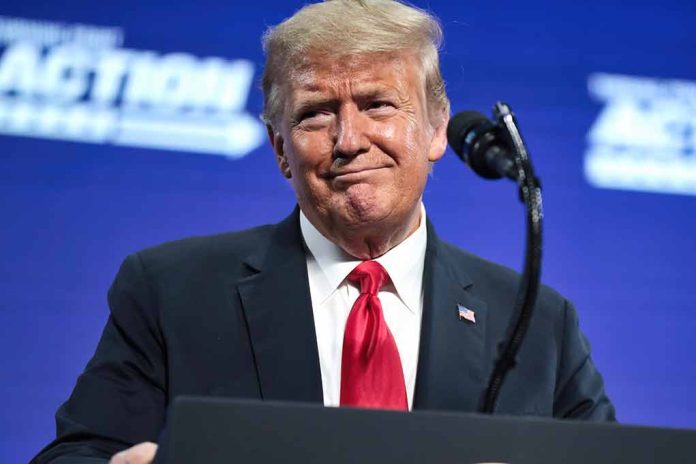
Former President Donald Trump proposes a bold tariff plan to address rising childcare costs and boost American manufacturing.
At a Glance
- Trump suggests using tariff revenue to subsidize childcare and other family expenses
- Plan aims to encourage purchase of American-made goods by making imports more expensive
- Proposal includes cutting corporate tax rate to 15% for U.S.-based companies
- Critics warn of potential inflation and job losses due to increased tariffs
Trump’s Tariff Plan for Childcare and Manufacturing
In a recent speech at the Economic Club of New York, former President Donald Trump unveiled a comprehensive economic strategy aimed at addressing the rising cost of childcare while simultaneously revitalizing American manufacturing. The cornerstone of this plan involves implementing higher tariffs on foreign imports, with the generated revenue earmarked for subsidizing childcare services and other family-related expenses.
Trump’s proposal is rooted in his “America First” philosophy, which he describes as “common sense.” The former president emphasized the potential benefits of his plan, stating, “We’re going to be taking in trillions of dollars, and as much as child care is talked about as being expensive, it’s — relatively speaking — not very expensive, compared to the kind of numbers we’ll be taking in.”
Trump says tariffs are how he will reduce the cost of child care. Or something. https://t.co/VFa5hGk1La
— Steve Tally (@SteveTally) September 5, 2024
Impact on Manufacturing and Jobs
Trump’s tariff strategy is designed to benefit U.S. manufacturing by making imported products more expensive, thereby encouraging consumers to buy American-made goods. This approach aligns with his broader economic vision, which includes slashing the corporate tax rate to 15% for U.S.-based companies and implementing a “one-in, ten-out” regulatory policy to reduce bureaucratic red tape.
“Some might say it’s economic nationalism. I call it common sense. I call it America First,” he said on Thursday.
The former president also proposed a national emergency declaration to increase domestic energy supply and expedite approvals for new energy projects. These measures, according to Trump, would lead to lower energy prices and stimulate economic growth.
Criticism and Support
While Trump’s plan has garnered support from those who favor protectionist trade policies, it has also faced significant criticism from economists and policy experts. Critics argue that the proposed tariffs could exacerbate inflation and harm consumers by raising prices on a wide range of goods.
“I believe Trump has already spent this revenue, to pay for his tax cuts (which it doesn’t), or to perhaps end the income tax (which it cannot),” she said in an email. “It is unclear how there would be any revenues left over to fund child care.” – Kimberly Clausing
The Tax Foundation has estimated that Trump’s proposed tariffs would result in a $524 billion yearly tax hike, potentially shrinking the economy and costing 684,000 jobs. Additionally, the Penn Wharton Budget Model projected that reducing the corporate tax rate to 15% would cost $5.8 trillion over a decade, raising questions about the fiscal viability of the plan.
Trump suggests tariffs can help solve rising child care costs in a major economic speech https://t.co/agiDDQGQXK
— PottstownMercury (@MercuryX) September 5, 2024
Looking Ahead
As the 2024 presidential race heats up, Trump’s economic proposals are likely to face intense scrutiny and debate. The upcoming presidential debates are expected to focus heavily on the contrasting economic visions of Trump and his Democratic opponent, with childcare costs and manufacturing jobs likely to be key topics of discussion.
While Trump’s tariff plan presents a bold approach to addressing childcare costs and boosting American manufacturing, its effectiveness and potential consequences remain subjects of fierce debate among economists, policymakers, and voters alike.
Sources
- Trump suggests tariffs can help solve rising child care costs in a major economic speech
- WATCH: Trump suggests tariffs can reduce child care costs at New York economic event
- Trump suggests tariffs can help solve rising child care costs in a major economic speech
- Trump suggests tariffs can help solve rising child care costs in a major economic speech
- Trump keeps claiming tariffs will solve problems like child care – proving he’s ‘stupid’
- Trump suggests tariffs can help solve rising childcare costs in major economic speech






